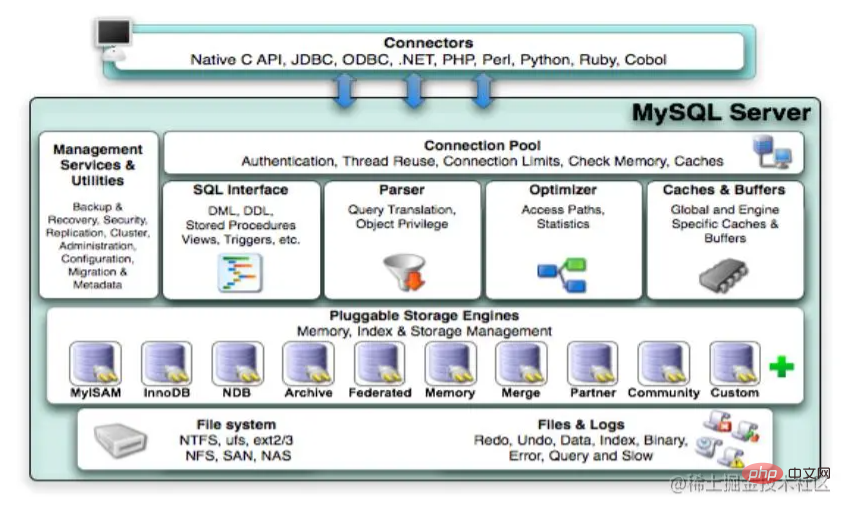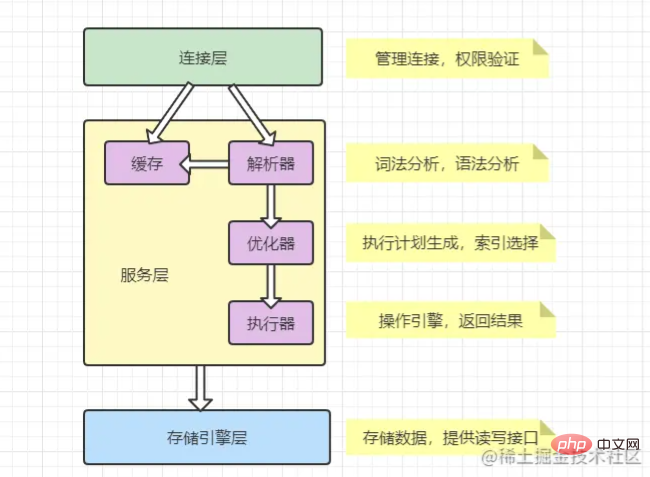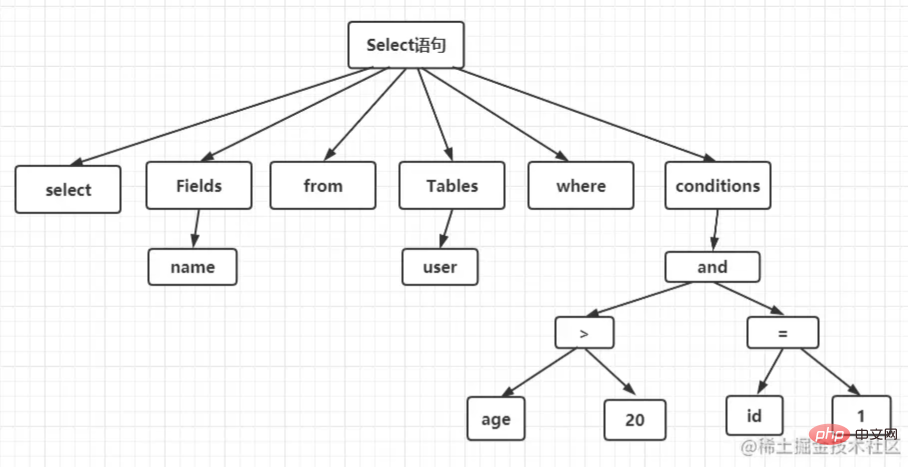 Database
Database
 Mysql Tutorial
Mysql Tutorial
 In-depth analysis of the execution process of SQL in MySQL (combination of pictures and text)
In-depth analysis of the execution process of SQL in MySQL (combination of pictures and text)
In-depth analysis of the execution process of SQL in MySQL (combination of pictures and text)
This article will take you to understand the SQL execution process in MySQL and see how MySQL executes a query statement? I hope to be helpful!

For a development engineer, I think it is very necessary to understand how MySQL executes a query statement. [Related recommendations: mysql video tutorial]
First of all, we need to understand what the architecture of MYSQL looks like? Then let’s talk about the execution process of a query statement?
MYSQL architecture
First look at an architecture diagram, as follows:

Detailed module explanation
Connector: Used to support interaction between various languages and SQL, such as PHP, Python, Java's JDBC;Management Serveices & Utilities: System management and control tools, including backup and recovery, MySQL replication, clustering, etc.;##Connection Pool
: Connection pool, Manage resources that need to be buffered, including user password permission threads, etc.;SQL Interface
: used to receive the user's SQL commands and return the query results required by the user;Parser
: used to parse SQL statements;Optimizer
: query optimizer;Cache and Buffer
: Query cache, in addition to the cache of row records, there is also table cache, Key cache, permission cache, etc.;Pluggable Storage Engines
: Plug-in storage engine, which provides API for the service layer to use and deal with specific files.
Divide MySQL into three layers, the connection layer that interfaces with the client, the service layer that actually performs operations, and the layer that deals with hardware Storage engine layer.

Connection layer
To connect our client to the MySQL server port 3306, it must be established with the server connection, then manage all connections, verify the identity and permissions of the client, these functions are completed in the connection layer.Service layer
The connection layer will hand over the SQL statement to the service layer, which includes a series of processes: For example, query cache Judgment, call the corresponding interface according to SQL, and perform lexical and grammatical analysis of our SQL statements (such as how to identify keywords, how to identify aliases, whether there are any grammatical errors, etc.). Then there is the optimizer. The bottom layer of MySQL will optimize our SQL statements according to certain rules, and finally hand them over to the executor for execution.Storage engine
The storage engine is where our data is actually stored. MySQL supports different storage engines. Next down is the memory or disk.SQL execution process
Taking a query statement as an example, let’s take a look at what the MySQL workflow is like.select name from user where id=1 and age>20;

- Short connection: A short connection means that it will be closed immediately after the operation is completed. Long connection: A long connection can be kept open, reducing the cost of creating and releasing connections on the server side. This connection can also be used when subsequent programs access it.
show global variables like 'wait_timeout';
show variables like 'query_cache%';
第二个是表里面任何一条数据发生变化的时候,这张表所有缓存都会失效,所以对于有大量数据更新的应用,也不适合。
所以缓存还是交给 ORM 框架(比如 MyBatis 默认开启了一级缓存),或者独立的缓存服务,比如 Redis 来处理更合适。
在 MySQL 8.0 中,查询缓存已经被移除了。
语法解析和预处理
为什么一条 SQL 语句能够被识别呢?假如随便执行一个字符串 hello,服务器报了一个 1064 的错:
[Err] 1064 - You have an error in your SQL syntax; check the manual that corresponds to your MySQL server version for the right syntax to use near 'hello' at line 1
这个就是 MySQL 的解析器和预处理模块。
这一步主要做的事情是对语句基于 SQL 语法进行词法和语法分析和语义的解析。
词法解析
词法分析就是把一个完整的 SQL 语句打碎成一个个的单词。
比如一个简单的 SQL 语句:select name from user where id = 1 and age >20;

它会将 select 识别出来,这是一个查询语句,接下来会将 user 也识别出来,你是想要在这个表中做查询,然后将 where 后面的条件也识别出来,原来我需要去查找这些内容。
语法分析
语法分析会对 SQL 做一些语法检查,比如单引号有没有闭合,然后根据 MySQL 定义的语法规则,根据 SQL 语句生成一个数据结构。这个数据结构我们把它叫做解析树(select_lex)。
就比如英语里面的语法 “我用 is , 你用 are ”这种,如果不对肯定是不可以的,语法分析之后发现你的 SQL 语句不符合规则,就会收到 You hava an error in your SQL syntax 的错误提示。
预处理器
如果写了一个词法和语法都正确的 SQL,但是表名或者字段不存在,会在哪里报错? 是在数据库的执行层还是解析器?比如:select * from hello;
还是在解析的时候报错,解析 SQL 的环节里面有个预处理器。它会检查生成的解析树,解决解析器无法解析的语义。比如,它会检查表和列名是否存在,检查名字和别名, 保证没有歧义。预处理之后得到一个新的解析树。
查询优化器
一条SQL语句是不是只有一种执行方式?或者说数据库最终执行的SQL是不是就是我们发送的 SQL?
这个答案是否定的。一条 SQL 语句是可以有很多种执行方式的,最终返回相同的结果,他们是等价的。但是如果有这么多种执行方式,这些执行方式怎么得到的?最终选择哪一种去执行?根据什么判断标准去选择?
这个就是 MySQL 的查询优化器的模块(Optimizer)。 查询优化器的目的就是根据解析树生成不同的执行计划(Execution Plan),然后选 择一种最优的执行计划,MySQL 里面使用的是基于开销(cost)的优化器,那种执行计划开销最小,就用哪种。
可以使用这个命令查看查询的开销:
show status like 'Last_query_cost';
MySQL 的优化器能处理哪些优化类型呢?
举两个简单的例子:
1、当我们对多张表进行关联查询的时候,以哪个表的数据作为基准表。
2、有多个索引可以使用的时候,选择哪个索引。
实际上,对于每一种数据库来说,优化器的模块都是必不可少的,他们通过复杂的算法实现尽可能优化查询效率的目标。但是优化器也不是万能的,并不是再垃圾的 SQL 语句都能自动优化,也不是每次都能选择到最优的执行计划,大家在编写 SQL 语句的时候还是要注意。
执行计划
优化器最终会把解析树变成一个执行计划(execution_plans),执行计划是一个数据结构。当然,这个执行计划不一定是最优的执行计划,因为 MySQL 也有可能覆盖不到所有的执行计划。
我们怎么查看 MySQL 的执行计划呢?比如多张表关联查询,先查询哪张表?在执行查询的时候可能用到哪些索引,实际上用到了什么索引?
MySQL 提供了一个执行计划的工具。我们在 SQL 语句前面加上 EXPLAIN,就可以看到执行计划的信息。
EXPLAIN select name from user where id=1;
存储引擎
在介绍存储引擎先来问两个问题:
1、从逻辑的角度来说,我们的数据是放在哪里的,或者说放在一个什么结构里面?
2、执行计划在哪里执行?是谁去执行?
存储引擎基本介绍
在关系型数据库里面,数据是放在表 Table 里面的。我们可以把这个表理解成 Excel 电子表格的形式。所以我们的表在存储数据的同时,还要组织数据的存储结构,这个存储结构就是由我们的存储引擎决定的,所以我们也可以把存储引擎叫做表类型。
在 MySQL 里面,支持多种存储引擎,他们是可以替换的,所以叫做插件式的存储引擎。为什么要支持这么多存储引擎呢?一种还不够用吗?
在 MySQL 里面,每一张表都可以指定它的存储引擎,而不是一个数据库只能使用一个存储引擎。存储引擎的使用是以表为单位的。而且,创建表之后还可以修改存储引擎。
如何选择存储引擎?
如果对数据一致性要求比较高,需要事务支持,可以选择 InnoDB。
如果数据查询多更新少,对查询性能要求比较高,可以选择 MyISAM。
如果需要一个用于查询的临时表,可以选择 Memory。
如果所有的存储引擎都不能满足你的需求,并且技术能力足够,可以根据官网内部手册用 C 语言开发一个存储引擎。(https://dev.mysql.com/doc/internals/en/custom-engine.html%EF%BC%89 )
执行引擎
谁使用执行计划去操作存储引擎呢?这就是执行引擎(执行器),它利用存储引擎提供的相应的 API 来完成操作。
为什么我们修改了表的存储引擎,操作方式不需要做任何改变?因为不同功能的存储引擎实现的 API 是相同的。
最后把数据返回给客户端,即使没有结果也要返回。
栗子
还是以上面的sql语句为例,再来梳理一下整个sql执行流程。
select name from user where id = 1 and age >20;
通过连接器查询当前执行者的角色是否有权限,进行查询。如果有的话,就继续往下走,如果没有的话,就会被拒绝掉,同时报出
Access denied for user的错误信息;接下来就是去查询缓存,首先看缓存里面有没有,如果有呢,那就没有必要向下走,直接返回给客户端结果就可以了;如果缓存中没有的话,那就去执行语法解析器和预处理模块。( MySQL 8.0 版本直接将查询缓存的整块功能都给删掉了)
语法解析器和预处理主要是分析sql语句的词法和语法是否正确,没啥问题就会进行下一步,来到查询优化器;
-
查询优化器就会对sql语句进行一些优化,看哪种方式是最节省开销,就会执行哪种sql语句,上面的sql有两种优化方案:
- 先查询表 user 中 id 为 1 的人的姓名,然后再从里面找年龄大于 20 岁的。
- 先查询表 user 中年龄大于 20 岁的所有人,然后再从里面找 id 为 1 的。
优化器决定选择哪个方案之后,执行引擎就去执行了。然后返回给客户端结果。
更多编程相关知识,请访问:编程视频!!
The above is the detailed content of In-depth analysis of the execution process of SQL in MySQL (combination of pictures and text). For more information, please follow other related articles on the PHP Chinese website!

Hot AI Tools

Undresser.AI Undress
AI-powered app for creating realistic nude photos

AI Clothes Remover
Online AI tool for removing clothes from photos.

Undress AI Tool
Undress images for free

Clothoff.io
AI clothes remover

AI Hentai Generator
Generate AI Hentai for free.

Hot Article

Hot Tools

Notepad++7.3.1
Easy-to-use and free code editor

SublimeText3 Chinese version
Chinese version, very easy to use

Zend Studio 13.0.1
Powerful PHP integrated development environment

Dreamweaver CS6
Visual web development tools

SublimeText3 Mac version
God-level code editing software (SublimeText3)

Hot Topics
 PHP's big data structure processing skills
May 08, 2024 am 10:24 AM
PHP's big data structure processing skills
May 08, 2024 am 10:24 AM
Big data structure processing skills: Chunking: Break down the data set and process it in chunks to reduce memory consumption. Generator: Generate data items one by one without loading the entire data set, suitable for unlimited data sets. Streaming: Read files or query results line by line, suitable for large files or remote data. External storage: For very large data sets, store the data in a database or NoSQL.
 How to optimize MySQL query performance in PHP?
Jun 03, 2024 pm 08:11 PM
How to optimize MySQL query performance in PHP?
Jun 03, 2024 pm 08:11 PM
MySQL query performance can be optimized by building indexes that reduce lookup time from linear complexity to logarithmic complexity. Use PreparedStatements to prevent SQL injection and improve query performance. Limit query results and reduce the amount of data processed by the server. Optimize join queries, including using appropriate join types, creating indexes, and considering using subqueries. Analyze queries to identify bottlenecks; use caching to reduce database load; optimize PHP code to minimize overhead.
 How to use MySQL backup and restore in PHP?
Jun 03, 2024 pm 12:19 PM
How to use MySQL backup and restore in PHP?
Jun 03, 2024 pm 12:19 PM
Backing up and restoring a MySQL database in PHP can be achieved by following these steps: Back up the database: Use the mysqldump command to dump the database into a SQL file. Restore database: Use the mysql command to restore the database from SQL files.
 How to insert data into a MySQL table using PHP?
Jun 02, 2024 pm 02:26 PM
How to insert data into a MySQL table using PHP?
Jun 02, 2024 pm 02:26 PM
How to insert data into MySQL table? Connect to the database: Use mysqli to establish a connection to the database. Prepare the SQL query: Write an INSERT statement to specify the columns and values to be inserted. Execute query: Use the query() method to execute the insertion query. If successful, a confirmation message will be output.
 How to fix mysql_native_password not loaded errors on MySQL 8.4
Dec 09, 2024 am 11:42 AM
How to fix mysql_native_password not loaded errors on MySQL 8.4
Dec 09, 2024 am 11:42 AM
One of the major changes introduced in MySQL 8.4 (the latest LTS release as of 2024) is that the "MySQL Native Password" plugin is no longer enabled by default. Further, MySQL 9.0 removes this plugin completely. This change affects PHP and other app
 How to use MySQL stored procedures in PHP?
Jun 02, 2024 pm 02:13 PM
How to use MySQL stored procedures in PHP?
Jun 02, 2024 pm 02:13 PM
To use MySQL stored procedures in PHP: Use PDO or the MySQLi extension to connect to a MySQL database. Prepare the statement to call the stored procedure. Execute the stored procedure. Process the result set (if the stored procedure returns results). Close the database connection.
 How to create a MySQL table using PHP?
Jun 04, 2024 pm 01:57 PM
How to create a MySQL table using PHP?
Jun 04, 2024 pm 01:57 PM
Creating a MySQL table using PHP requires the following steps: Connect to the database. Create the database if it does not exist. Select a database. Create table. Execute the query. Close the connection.
 The difference between oracle database and mysql
May 10, 2024 am 01:54 AM
The difference between oracle database and mysql
May 10, 2024 am 01:54 AM
Oracle database and MySQL are both databases based on the relational model, but Oracle is superior in terms of compatibility, scalability, data types and security; while MySQL focuses on speed and flexibility and is more suitable for small to medium-sized data sets. . ① Oracle provides a wide range of data types, ② provides advanced security features, ③ is suitable for enterprise-level applications; ① MySQL supports NoSQL data types, ② has fewer security measures, and ③ is suitable for small to medium-sized applications.





